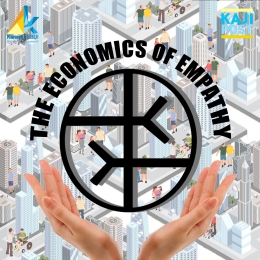Those economics areas are (1) game theory, (2) welfare economics and interpersonal utility comparison, and (3) the recent talk-of-the-town behavioral economics along with neuroeconomics. In the next discussion, we will go into the first and third economics area since the usage of mentioned areas has been widening in the present-day.
Empathy in game theory plays a major role in the context of determining strategic behavior that will affect decision-making in the process. In game theory, there is a widely-known concept called prisoner dilemma in which it can give a relatively good reference in the use of empathy.
From an experiment done at Learning and Game Theory Laboratory in NYUAD, they conducted an experiment to test whether cooperation prevails in such game and will it (empathy) affect the nature of defect domination that's associated with Nash equilibrium based on empathy questionnaire acquired from IRI (Interpersonal Reactivity Index) scale and also from the game theory-based questionnaire (note that the game taken is a one-shot prisoner dilemma).
The result from this experiment shows that without the consideration of empathy, the domination strategy is the defective one and not the cooperative one. It further emphasizes how the classical game is being played, where eventually it will reach equilibrium at the defective result. On the other hand, when empathy is being considered the result now would be depended on the level of empathy and it turns out that it captures players' preferences better resulting in a higher outcome of cooperation.
The third economics area, which is behavioral economics and neuroeconomics, is particularly interesting since it is considered as a new field of economics that has gained much attention because of its evolutionary finding that combines economic theory with the results from neuroscientific research, and in this sense, will be a helping hand in determining in which area empathy will contribute in economics.
The findings from neuroscientists have proven that there exists empathy in heterogeneous form across experimental subjects (Singer et al, 2006). This heterogeneous form comes from the different degree that each person has in having empathy or we can call it as other-regarding preference. The conclusion that we can get from this claim is that indeed, people are aware and concerned about advantageous outcomes that come from people other than themselves, but this attitude is not consistent in respect of time and individually.
The reason behind it is because as proven by Cialdini et al (1997), the degree of empathy is affected by 'oneness' element in which it will be higher if someone feels empathetic towards those they deem close or at least they know about. This reason has been supported with Singer's discovery of brain activation that shows different empathy degree in respect of context and situation. Another finding behind this trend is because people are more concerned with the well-being of general others rather than specific others known as inequity aversion (Fehr & Schmidt, 1999). Inequity aversion itself is a condition where any deviations from equality will lead to a suffer felt by a person. In this regard, people will feel more empathetic towards the state of the whole population rather than only in terms of the individual.
Why It Matters
So, if the context of empathy is being under the limelight that much nowadays, why does it matter to the economy as a whole?
The answer to those questions is simple and unarguably proven.
It matters because empathy can actually bring more goodness towards the economy. This goodness can be seen in one of real-life evidence that we can get from the case of business outcomes and employee engagement.







